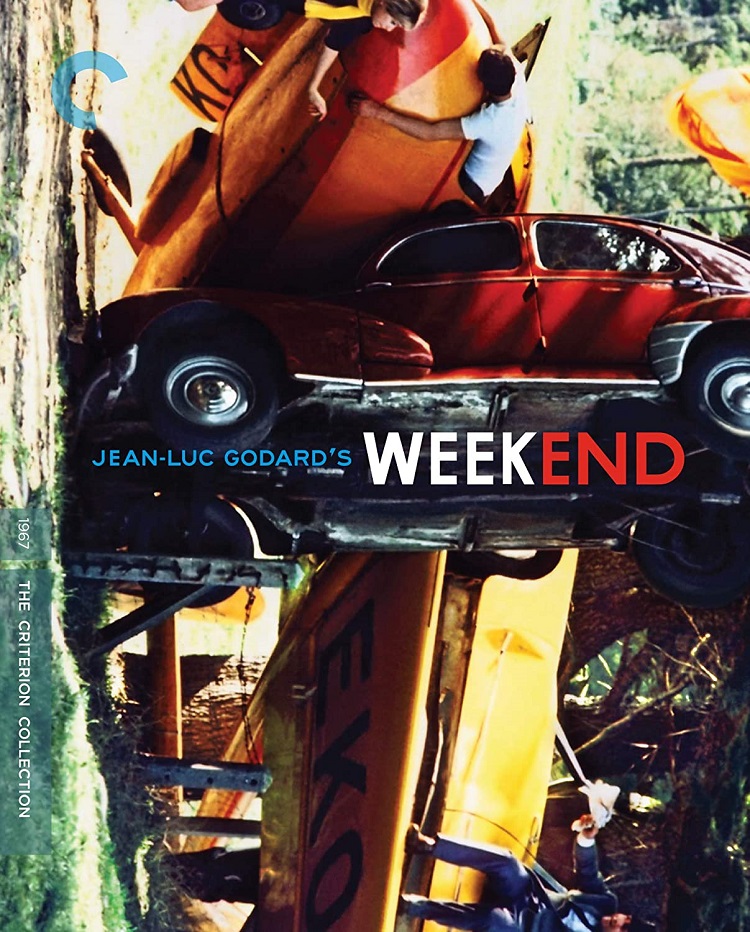
Written by Kristen Lopez
I probably shouldn’t have jumped at the first opportunity to review a film like Weekend (or Week End as it appears on IMDB). Despite being a classic film blogger/fanatic, I’m not well-versed in French films, nor have I see any Jean-Luc Godard films prior to this (although I have seen a few Fellini films). With that, I was able to appreciate what Godard placed upon the screen, and even though I didn’t understand the logic at times it was still a surreal and intriguing experience. Thankfully, the Criterion Collection has assembled a medley of bonus features that go a long way towards explaining the history of the film, allowing viewers to gain a better understanding of why Weekend is so significant. I recommend watching these features before actual film.
Corinne (Mireille Darc) and her husband Roland (Jean Yanne) have a tempestuous marriage with each having designs on murdering the other. Corinne’s father is set to leave her an inheritance, so the two decide to take an idyllic drive through the countryside to see him (and possibly hasten his death). Along the way they discover a dark and hostile world filled with cannibalism, revolution, and literary figures.
Godard mentioned that Weekend was the one film of his that followed a proper narrative and can be easily explained to others; that’s true. I understood the basic gist of Weekend, it’s only once Corinne and Roland get on the road that the film opens up a surreal rabbit hole that you’ll really have to struggle to understand. The opening scenes within the couple’s home acts like a dark comedy. Both Corinne and Roland have lovers, they hate each other, and they hate everyone around them. Upon talking to each other they mention a car accident (a common theme throughout the film) and their desire that the people involved died. The need for violence doesn’t just follow them; it extends out to the rest of the world starting with a fender bender that culminates with two people beating a man senseless.
As an American, I can’t pinpoint the key points in French history that this world of violence is discussing, but considering America’s own violent involvement in the 1960s Godard definitely has something to say. The fact that the film was released right before 1968, the bloodiest time in U.S. history at the point, sharpens the focus of this film’s violent tendencies. Godard includes a lengthy speech calling for a “black revolution.” The horrors of Charles Manson two years later, himself trying to spark a race war, make this segment all the more chilling. The eight-minute tracking shot Godard uses, showing a steady stream of traffic leading up to a horrific crash with bodies strewn on the road, is a haunting image. Any person can be responsible for death the minute they get behind the wheel, and the way cars are littered throughout the countryside Godard shows a stark reality where human life isn’t appreciated. Outside this world of violence there’s also biting social commentary involving class struggle, and gender bias. I particularly loved the discussion a hitchhiker has with Corinne about her names all tracing back to a man.
If tackling violence and class struggle wasn’t enough, Godard also lampoons cinema itself. One character mentions that it’s the “beginning of Flamboyance…especially in the cinema;” the end credits mention the end of cinema itself; and both Corinne and Roland know they’re in a film. The humor shines through in these moments, especially when Roland and Corinne meet up with an increasingly wacky cast of characters that they deem crazy. By the end Corinne and Roland become the crazy ones. I won’t mention the shocking ending, but I was left laughing at their meeting with Emily Bronte…who they eventually set on fire!
Ultimately the film tells how the “horror of the bourgeoisie must be fought with more horror.” Godard excoriates the wealthy classes who have no idea of the political climate as their left floundering for a ride because they can’t answer the political questions right. I wouldn’t pop in Weekend for fun, but it’s a sharp and blinding commentary on the world climate at the time that isn’t afraid to offend, or be incredibly weird. The film is not for the average fan that wants to dive into French New Wave, or wants to collect every Criterion disc.
The bonus features do a fantastic job of showcasing the back-story, and future importance of this film. I can’t stress enough that you should read the essay booklet included with the film. The essay by Gary Indiana is a well-written analysis of the film that discusses the political climate and particular scenes of the film. There’s also a behind-the-scenes essay, and an interview with Godard that’s included in the booklet. On the disc itself there’s “Revolutions per Second,” a 20-minute essay by Kent Jones. It too discusses a lot of the issues discussed in the Indian essay, but here Jones’ dry delivery can make this feel boring. It does go into detail on French history as well as various themes in all of Godard’s work. Other features include various interviews with the film’s cinematographer, assistant director, and stars; an on-location segment that lasts eight minutes and was originally aired for French television; and both French and U.S. trailers for this film that ran in 1967.